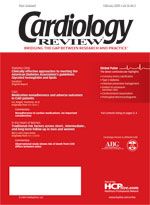Coronary artery disease and polypharmacy in women
Once again it is time for Cardiology Review’s special issue on “Cardio­vas­cular Disease in Women.” This year’s version has 2 articles dealing with coronary artery disease (CAD) and with the broader issue of polypharmacy. The first of our 2 CAD articles is by Drs John Pfeifer and Richard M. Steingart and their specific subject matter is acute coronary syndromes. In the context of the Women’s Health Initiative, the Women’s Ischemia Syndrome Evaluation, and the American Heart Association/American College of Cardiology’s acute coronary syndrome guidelines (and subsequent CRUSADE Reg­istry), the au­thors discuss how the presentation of unstable angina and acute myo­cardial infarction differs in men and women, what different treatment options are available, and how prognosis is or isn’t gender related. Dr. Marian Limacher comments for Cardiology Review. The problem of depression in wom­en following coronary artery bypass surgery is the subject of analysis by Drs Susmita Mallik and Viola Vaccarino. Using a large database of both men and women, these authors used various indexes to find that depressive symptoms are more likely to affect women after bypass surgery, resulting in lack of functional improvement. Dr Joan K. Cohn, our psycho­therapist-in-residence, offers her views as to why this is so.
The polypharmacy issue is a complex one but Dr Verena Stangl and her colleagues from Berlin have categorized the various types of drugs and their possible gender-specific as­pects in a very comprehensive yet surprisingly concise manner. Dr Stephen P. Glasser, the Associate Editor of Cardiology Review and an expert on pharmaceutical therapy (as evidenced by his “Drugs-in Trial” series run earlier in this publication), is as concerned as the authors are by the underrepresentation of women in evidence-based pharmacotherapy trials. He discusses some of the ramifications of this problem in his commentary and continues his series “Funda­mentals of Clincal Research” later in this issue.
In the Stroke section, research by Drs Tobias Kurth and Julie E. Buring correlated body mass index with the risk of stroke in a prospective study in 39,053 women. The clinical implication of their study is commented on by Dr Richard Stewart. Finally, a bonus feature in this month’s special issue is an interesting case presentation submitted by one of our readers, Dr John A. Tayek and colleagues, involving possible regression of diabetic retinopathy by statin therapy. We asked our ophthalmologic consult Dr Fadi El Baba to comment for Cardiology Review and to provide additional data on possible mechanisms for this phenomenon.
